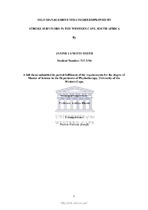| dc.description.abstract | Ischaemic heart disease and stroke were the leading causes of death and disability globally,
accounting for a combined 15 million deaths. Disability following a stroke is complex and
multidimensional. Disability and functioning post stroke can be conceptualized within the
framework of the International Classification of Functioning, Disability and Health (ICF).
The involvement of the individual in their rehabilitation and recovery is essential. Therefore,
it is a necessity for individuals, particularly in a low resource setting to engage in selfmanagement
activities. Bandura’s social cognitive theory based on self-efficacy, forms the
basis of self-management programmes. Self-management relates to one’s ability to manage
one’s consequences post stroke, and self-efficacy has been proven to be pivotal in the
management and improvement of long-term conditions. The aim of the study was to explore
the self-management strategies employed by stroke survivors in the Western Cape, South
Africa through an exploratory, qualitative design. Prior to the commencement of the data
collection phase, ethical clearance was sought from the University of the Western Cape
Research Ethics Committee. Participants were recruited from an urban and rural area in the
Western Cape. An interview guide was developed based on previous literature. Interview
questions were related to 1) what self-management strategies were adopted to address activity
limitations and participation restrictions and 2) strategies used to address environmental
challenges. | en_US |

